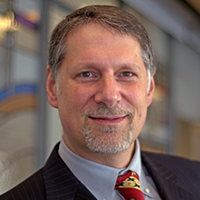Todd Austin earns MICRO Test of Time for vulnerability assessment of microarchitecture

S. Jack Hu Collegiate Professor of Computer Science and Engineering Todd Austin and his co-authors have been recognized with a 2022 MICRO Test of Time Award for their landmark 2003 paper, “A Systematic Methodology to Compute the Architectural Vulnerability Factors for a High-Performance Microprocessor.” The Test of Time Award recognizes the most influential papers published in prior sessions of the International Symposium on Microarchitecture, each of whom have had significant impact in the field. This is Austin’s fourth reception of the award in five years.
This paper introduced the concept of “architectural vulnerability factor (AVF),” which is a metric of exposure a CPU microarchitecture has to a certain class of errors. Called soft errors, in the world of electronics these describe a situation where a signal or piece of data is wrong. They’re “soft” because they don’t arise from a permanent error in the device, but from accumulated charge and interference from things like packaging and cosmic rays that eventually introduce a logical fault into the circuit’s operation.
The soft errors targeted by this paper arise mainly from data being left languishing inside microarchitectural buffers for too long. AVF was the first measurement of its kind that gave researchers and CPU designers an idea how long “too long” was, exactly. Specifically, AVF measures the probability that a fault in a processor structure will result in a visible error in the final output of a program. The paper introduced the idea of utilizing queuing theory to estimate how long exposed data languishes inside the buffers — the longer data languishes, the higher the CPU’s AVF grows, and the higher its exposure to soft errors.
The idea went on to see wide use in computer architecture, and the paper has over 1200 citations. The paper was co-authored with Shubhendu Mukherjee, Christopher Weaver, and Joel Emer, at the time all researchers at Intel, as well as former U-M faculty member Steven Reinhardt.
 MENU
MENU